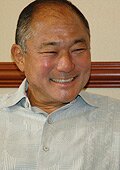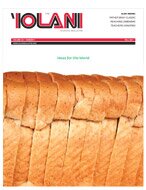This Issue
Fall 2011 - Department | Headmaster’s Column
Teaching and Doing
Great education depends on great teaching.
Great teachers have always understood that their real role is not to teach subjects but to teach students.
Great teachers have always understood that their real role is not to teach subjects but to teach students.
The Element-How Finding Your Passion Changes Everything
By Ken Robinson, Ph.D.
By Ken Robinson, Ph.D.

Isn’t there a better way to teach students and measure their progress? I think so. We need to focus on what happens before the tests and then seek authentic ways to demonstrate student learning.
At ‘Iolani we value quality teaching, teaching that goes beyond passive learning, worksheets, homework and multiple choice tests.
We need to focus on what happens before the tests and then seek authentic ways to demonstrate student learning.
I suspect that all of us have had teachers who made major differences in our lives. ‘Iolani graduates will remember Armstrong, Braden, Cano, Chao, Collier, Holden, Kang, Masters, Mexia, Moss, Nishiura, Pickering, Proctor, Sleight, Sumner, Suzuki and of course Keables, as well as others, past and present. Great education does indeed depend upon great teaching, and we are fortunate to have superb teachers in our ‘Iolani classrooms.
So, criterion number one is good teaching. But how can we recognize it and measure it?
One way is to use tests properly. Not make-or-break, prep-all-year tests that tempt principals and teachers to manipulate the results, but tests that follow the teacher’s curriculum rather than dictate it. If we use good tests tied to good teaching, we can then assess student progress accurately and fairly.
The Advanced Placement (AP) Program is an example of such a testing program. It has well-defined learning objectives and effective assessment processes. The AP scores earned by sophomores, juniors and seniors are the culmination of good teaching that begins in kindergarten and continues through the middle and high school years.
We administer over 800 exams a year, and the results are stellar. Half our students score 5’s, the highest mark given, and over 95% 3’s or higher, qualifying for college credit.
Another way to gauge progress is through authentic assessment measures. Varied writing assignments, independent research projects, publication in student magazines and newspapers, video or power point presentations and speeches are all examples of valid tools for checking learning.
Project based learning, notably in ChemCom and Conceptual Physics courses, as well as concerts, performances and creative work in the literary, performing and visual arts are also valid learning processes with built in evaluation mechanisms. United States History teachers Russell Motter and Josh Reppun employed a successful authentic learning activity by asking students to become practicing historians as they searched for original documents such as letters, and newspaper accounts to interpret a past event.
When I hear students say, “This was the best experience I ever had, simply amazing,” or “This was the most memorable activity I have had in my high school career, and there are many memorable ones,” or “This changed my life,” I know we are on the right track.
Contests play an important role in the teaching, learning and assessment processes. Athletics ask participants to work and sacrifice. Athletes perform in front of an audience, reap the emotional rewards of winning (and losing), learn teamwork, leadership and communication. The academic arena teaches the same lessons. Debate, robotics, the Real World Challenge, the Hong Kong Polytechnic Entrepreneurial Challenge, Math League and Math Bowl, the Science Bowl, the NASDAQ Economics Challenge, the Japan Bowl, the Ritsumekan Super Science Fair and other competitions, are all important teaching and learning opportunities.
When I hear students say, “This was the best experience I ever had, simply amazing,” or “This was the most memorable activity I have had in my high school career, and there are many memorable ones,” or “This changed my life,” I know we are on the right track. I also know that exemplary teachers are working tirelessly with bright and talented youth to make this happen.
Our teachers lead the way past bubble filling to activities that do more than measure; they stimulate, excite, expand and inspire students to learn, and in the process, enhance lives. An ‘Iolani education depends on ‘Iolani teachers.


